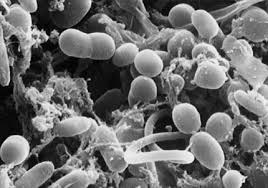RISK? check for yourself
Periodontal Disease is characterized by many unpleasant side effects: With periodontal disease your gums will show:
- swelling
- redness
- spontaneous bleeding
- bleeding on eating or tooth-brushing,
- bad breath
- tooth sensitivity
In its early stages, gum disease is called gingivitis. During these early stages, gum disease is more easily treatable than when it has gone unattended for a period of time.

A patient seen by Dr. Ki
m in 2003. She has uncontrolled periodontal disease
displaying bleeding, swelling, redness, bad breath, and accompanied by
movement and looseness of teeth.
Click here for Classification and Types of Periodontal Diseases
Periodontal disease is characterized by progressive, destruction of bone and gum tissue around otherwise healthy teeth. It is the plaque and calculus formed by bacterial plaque that is the primary cause for periodontal disease.
find out more about bacteria living in your mouth
Periodontal Disease is Caused by Bacteria

Over 500 species of bacteria live in a person's mouth. If you have healthy gums, your saliva removes most of these germs on an on-going basis. However, if you h
ave unhealthy gums, there is evidence to suggest that gum disease is associated with heart disease, diabetes and may increase respiratory complications in certain groups of people. Additionally, pregnant women are more likely to have a pre-term baby. In periodontal disease, the bacteria build between the teeth and gums. When these bacterial colonies multiply, any tear in the gum tissue allows bacteria into the blood stream. According to a current study, 70% of fatty deposits in the carotid arteries of stroke sufferers contain bacteria. Forty percent of these bacteria come from the mouth.
What Other Health Conditions do Gum Disease Effect?
Heart Disease
Evidence suggests that people with periodontal disease may be more at risk for heart disease.
In addition, they have nearly twice the risk of having a fatal heart attack than people without periodontal disease. In unhealthy gums, the bacteria become mixed up with the blood-clotting cells and form a clump that travels through the blood vessel. The vessel walls are irritated by the clumps of cells and bacteria. This irritation may stimulate the formation of heart-stopping blood clots.
Diabetes
It has been known for years that people with diabetes are more likely to have periodontal disease. But what recent research shows is that p
e
riodontal disease may make it even more difficult for people with diabetes t
o control their blood sugar. One study showed a reduction in the need for insulin in seven of nine diabetic patients being treated for periodontal disease.
Premature Birth
Pregnant women with gum disease are seven to eight times more likely to give birth prematurely and to have low birth weight babies. It is believed that periodontal disease causes damaged cells to release inflammation causing substances associated with pre-mature birth.
Respiratory Problems
Evidence suggest that incidence of nosocomical pneumonia in institionalized subjects, including those of intensive care units and nursing homes, may be reduced by improv
ing oral hygiene, which can be achieved by both mechanical or chemical approaches.

Teeth belong in your mouth, for a lifetime. Don't let this happen to you...
What Can Be Done?